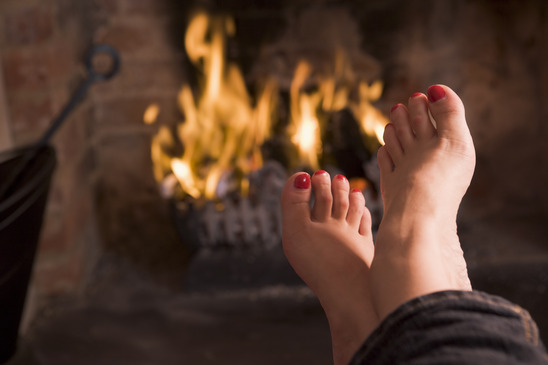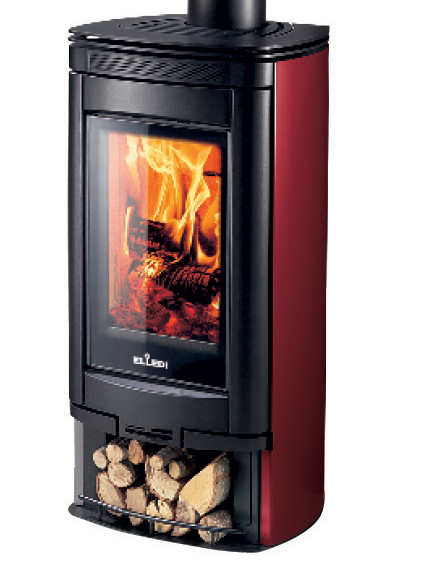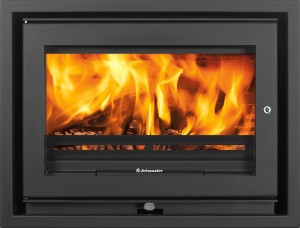
It’s been relatively mild this winter so far in Ireland as it’s been wet rather than frosty and unfortunately many people have experienced flooding. Having an alternative source of heat to electric, oil and gas can be a godsend at times ( I remember the oil running out when we were snowed in once, thank goodness for the fires). Open fires and stoves also provide a comforting glow as well as an effective source of heat.
Whether you are building a new home, renovating or perhaps wondering if you should insert a wood stove into your open fireplace, I hope these points will help you decide whether to opt for a wood stove or an open fire. We have one of each – a wood stove in the kitchen and an open fire in the living room.
Here are the advantages and disadvantages below:-
Advantages of Wood Stoves
1. Wood stoves can heat a room or can also heat a number of radiators. You can purchase
stoves sized appropriately for the size of the room and for heating the required number of radiators.
2. It is a really cheap source of fuel if you have your own source of firewood and of course, it’s renewable as well. We use fallen trees on the farm – it usually happens that one or two fall each year. Of course, you can also use stove coal and briquettes or purchased wood – all complying with the rules if you live in a smokeless fuel area of course.
3. The heat is distributed pretty evenly around the whole room – you don’t have to pull the armchair up to the stove to get nearer to the heat. It will also heat adjoining rooms too.
4. The amount of heat emitted can be controlled easily by turning a dial and altering the amount of air getting into the stove.
5. It is easy to keep clean. There is less dust than from an open fireplace and it is easy to empty the ashes from the tray once a day. The glass can be kept clean by wiping with a slightly damp newspaper page dipped in cool ash.
6. They add such a homely feel to a room too, even if unlit.
7. They are easy to light. We often leave ours lighting all night, just turn it down and the kitchen is lovely and cosy in the morning, with the stove just needing some more kindling.
8. Wood stoves come in a range of sizes and styles – you can choose from contemporary and sleek designs to those with a more ‘country’ theme.
Disadvantages of Wood Stoves
To be honest, I am struggling to think of disadvantages. As you might expect, they require a little maintenance from getting the chimney cleaned to polishing the stove. As the temperature is spread evenly around the room, you don’t get that ‘pull up the chair to the heat’ feeling. Wood needs to be seasoned and dry. If it is damp or unseasoned, not only will it not burn as well but moisture will build up in the chimney and will affect the ‘draw’ and hence the performance.
Disadvantages of Open Fires
1. Up to 70% of the heat goes up the chimney, they just aren’t as effective in converting energy to heat as a wood stove.
2. They do create more dust than a stove or other types of heat.
3. The chimney needs to be cleaned regularly.
Advantages of an Open Fire
Even though I believe the wood stove gives us a better performance, I am not going to install a stove into my open fireplace in the living room. Why not? Here’s the advantages of open fires:
1. There’s nothing like the crackle and sight of dancing flames in the fireplace to make a room seem cosy. All you need is a good book and a comfy armchair by the fire for a companionable evening – you don’t even need a TV. Perfect for creating a romantic setting too.
2. Larger logs will fit in a fireplace whereas they’d have to be chopped smaller for most wood stoves. A large log on a bed of coal should last an entire evening.
3. While logs don’t have to be as dry as for the stove, using dry and seasoned lumber means for a better fire. They are safer too as green wood burned can condense as tar and could create carbon monoxide gases.
4. Of course, you can get a stove that is fitted into an ‘open fireplace’ thereby it fulfils the traditional appearance with all the advantages of a wood stove.
Always be safe and install a carbon monoxide alarm as well as a smoke alarm. Getting chimneys swept regularly is crucial for eliminating the risk of gases as well as chimney fires.
Need help choosing a stove? Find a Heating Specialist to help








